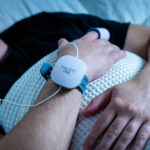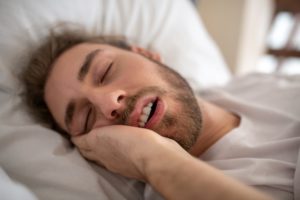When you buy through our links, we may earn a commission. Products or services may be offered by an affiliated entity. Learn more.
Sleep Apnea Exercises for Snoring
- Mouth and throat exercises (oropharyngeal exercises) can help reduce snoring and improve mild to moderate obstructive sleep apnea by strengthening airway muscles.
- These exercises work by strengthening the tongue, soft palate, and throat muscles and promoting nasal breathing.
- To see benefits, you’ll typically need to practice these exercises two to three times a day for about three months.
- These exercises are not a standalone treatment for sleep apnea and should be used alongside medical guidance and other therapies as prescribed by a health professional.
Snoring can be frustrating for both the person who snores and those who share their space, often leading to disrupted sleep or even separate bedrooms.
For people with mild snoring, studies suggest that mouth and throat exercises can strengthen the muscles around the airway, helping to make snoring less frequent and less noisy. These same exercises have also been shown to benefit individuals with mild to moderate obstructive sleep apnea (OSA) by improving muscle tone and airway stability.
Like any exercise routine, results take time and consistency. With regular practice, many people report less snoring, better sleep quality, and fewer sleep apnea symptoms.
Snoring? It Could Be a Sign of Sleep Apnea
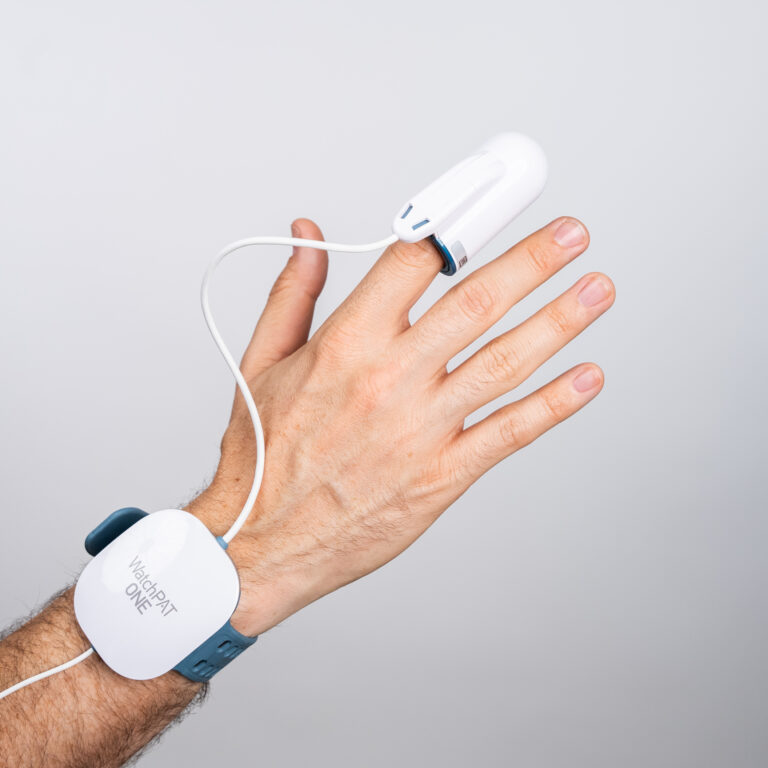
our partner at sleepdoctor.com
10% off Home Sleep Tests
Buy Now“Truly grateful for this home sleep test. Fair pricing and improved my sleep!”
Dawn G. – Verified Tester
Causes of Snoring and Sleep Apnea
During sleep, the space behind our tongue narrows, and the tissue around it becomes floppy and relaxed. When air gets forced through as we breathe in and out, the tissue flutters, making noise like a flag whipping in the wind. Snoring happens when the airflow from breathing causes floppy tissue in the back of the throat to vibrate.
Obstructive sleep apnea happens when floppy muscles in the back of the throat relax to the point where the muscles nearly or completely closes off the airway. This disrupts sleep and can cause low oxygenation during sleep.
Sleep Apnea Exercises for Snoring
There are various types of exercises meant to strengthen the tongue, facial muscles, and throat through specific training techniques. Each of these exercises can be grouped together in various ways and performed two to three times per day.
Tongue Exercises

Tongue Slide
- Place the tip of your tongue against the back of your top front teeth.
- Slowly slide your tongue backward with the tip moving along the roof of your mouth.
- Repeat 5 to 10 times.
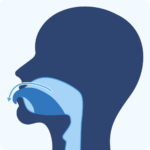
Tongue Stretch
- Stick out your tongue as far as you can.
- Try to touch your chin with your tongue while looking at the ceiling.
- Hold for 10 to 15 seconds and increase the duration gradually.
- Repeat 5 times.
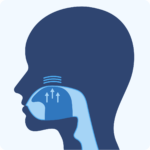
Tongue Push Up
- Stick your tongue upward against the roof of your mouth and press your entire tongue against it.
- Hold this position for 10 seconds.
- Repeat 5 times.
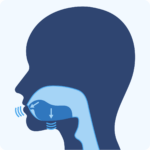
Tongue Push Down
- Put the tip of your tongue against your lower front teeth and then push the back of your tongue flat against the floor of your mouth.
- Hold this position for 10 seconds.
- Repeat 5 times.
Face Exercises
Cheek Hook
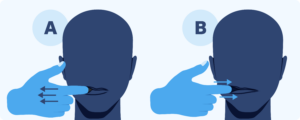
- Use a hooked finger to lightly pull your right cheek outward.
- Then, use your facial muscles to pull your cheek back inward.
- Repeat 10 times on each side.
Jaw Stretch
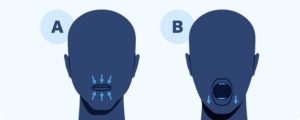
- Tightly close your mouth by pursing your lips.
- Then open your mouth, relaxing your jaw and lips.
- Repeat 10 times.
Other Exercises
Breathing Through Your Nose
This exercise improves nasal breathing, which stabilizes the airway during sleep.
- With your mouth closed and your jaw relaxed, inhale through your nose.
- Then, take a finger or knuckle and close off one nostril.
- Breathe out gently through the open nostril.
- Do this about 10 times while alternating between nostrils.
Tip: If you notice one nostril tends to be more congested than the other, work on breathing through the congested nostril.
Pronouncing Vowel Sounds
Saying different vowel sounds involves the muscles in your throat, so deliberately repeating these sounds can help tone those muscles.
- Repeat the vowel sounds: A, E, I, O, and U.
- Start by saying each normally.
- Next, adjust how much you stretch out the sound or how rapidly you say the vowel.
- Repeat the same sound 10 or 20 times in a row, then change to a different sound.
- You can combine sounds (such as ooo-aaah) and repeat those as well.
Singing
Singing activates multiple muscles in the mouth and throat and involves pronouncing diverse sounds, including vowels. Preliminary research has found that focused singing training may cut down on snoring. When singing, try to focus on repeating and forcefully pronouncing individual sounds rather than just singing normal lyrics.
Is Your Snoring a Health Risk?
Answer three questions to understand if you should be concerned.
How Mouth Exercises May Help With Snoring and Sleep Apnea
Mouth exercises are also called “myofunctional therapy” or “oropharyngeal exercises.” They’re often taught by a trained myofunctional therapist and can tone the airway and tongue muscles while promoting breathing through the nose. The oropharynx is the area at the back of your mouth that includes the back of the tongue, sides of the throat, tonsils, adenoids, and soft palate (the soft muscular part at the back of the roof of the mouth).
Researchers have found that doing repetitive oropharyngeal exercises while you’re awake can help keep the tissue from becoming excessively floppy and vibrating during sleep. Several studies have shown that toning these muscles has been shown to help reduce snoring and milder forms of obstructive sleep apnea.
Who Can Benefit
The benefits of these mouth and throat exercises have been widely studied in people who snore or have mild to moderate obstructive sleep apnea. People with obstructive sleep apnea have the most benefit with myofunctional therapy when used in conjunction with a CPAP machine or after surgery.
It is important to note that even for mild snoring, mouth and throat exercises are not always effective. Individual factors, like the size and shape of a person’s mouth, tongue, and throat, may affect how well these exercises work.
Oropharyngeal exercises may be less effective if a person’s snoring is related to alcohol or use of sedatives that cause relaxation of the muscles in the back of the throat.
How Often to Do Mouth Exercises
Based on the existing research, the best bet is to do mouth exercises for at least 10 minutes per day for three months in order to notice a reduction in snoring or OSA. Most people perform the exercises two to three times per day.
Most research studies demonstrate benefit after 3 months of mouth and throat exercises. Another study showed that performing myofunctional exercises as part of a smartphone game for at least 15 minutes per day was effective in improving snoring.
As with any workout, it takes time to build muscle, so you shouldn’t expect anti-snoring exercises to work overnight. The good thing about these exercises is that you don’t need any special gym equipment–you can do them almost anywhere. Over time, regular mouth and throat exercises will strengthen your airway muscles, making them less likely to cause an obstruction.
When to See a Doctor
Some cases of snoring are an indicator of obstructive sleep apnea, an underlying sleep disorder. Sleep apnea can have serious health consequences if it goes undiagnosed and untreated. If you have any of these risk factors, it’s important to talk with a doctor:
- Snoring that resembles gasping, choking, or snorting
- Notable daytime sleepiness or fatigue
- Mood changes, slowed thinking, or reduced attention span
- Morning headaches
- High blood pressure
- Obesity or recent weight gain
While mouth exercises can be a helpful home remedy for snoring and obstructive sleep apnea, they aren’t a cure-all. These exercises may reduce symptoms for some people but often work best when combined with doctor-recommended treatments. Many people who snore also benefit from using anti-snoring mouthpieces, which either move the lower jaw forward or hold the tongue in place to improve airflow and reduce snoring.
It’s important not to rely on mouth exercises alone or replace prescribed treatments without medical guidance. Always consult a doctor before starting or stopping any therapy for snoring or sleep apnea. For personalized instruction, your doctor may recommend a speech therapist or specialist trained in exercises that strengthen the mouth, tongue, and throat muscles.
Frequently Asked Questions
What exercise is best for sleep apnea?
Based on our research and expertise, any of the exercises we listed above are excellent for working to reduce sleep apnea. The most important thing is consistency. However, these exercises work best for mild cases of snoring and OSA, so we recommend going to see a professional if you start to experience symptoms of severe sleep apnea.
Can sleep apnea be reversed with exercise?
It depends on the severity of your sleep apnea. Consistently doing these exercises can help with mild symptoms of sleep apnea and snoring by strengthening the airway and tongue muscles and encouraging breathing through the nose. However, it won’t necessarily reverse more serious symptoms or a diagnosis.
How can I fix my sleep apnea naturally?
You can’t “fix” sleep apnea, but other home remedies to help with sleep apnea symptoms may include maintaining a healthy weight through diet and exercise and avoiding alcohol, smoking, and sedatives. At night, you can elevate your head with high loft pillows that prevent you from rolling onto your back.

Still have questions? Ask our community!
Join our Sleep Care Community — a trusted hub of sleep health professionals, product specialists, and people just like you. Whether you need expert sleep advice for your insomnia or you’re searching for the perfect mattress, we’ve got you covered. Get personalized guidance from the experts who know sleep best.
References
7 Sources
-
De Felicio, C.M., da Silva Dias, F.V., Voi Trawitzki, .LV. (2018) Obstructive sleep apnea: focus on myofunctional therapy. Nature and Science of Sleep, 10:271-286.
https://www.ncbi.nlm.nih.gov/pmc/articles/PMC6132228/ -
Ojay, A., & Ernst, E. (2000). Can singing exercises reduce snoring? A pilot study. Complementary therapies in medicine, 8(3), 151–156.
https://linkinghub.elsevier.com/retrieve/pii/S0965229900903765 -
Hilton, M. P., Savage, J. O., Hunter, B., McDonald, S., Repanos, C., & Powell, R. (2013). Singing Exercises Improve Sleepiness and Frequency of Snoring among Snorers—A Randomised Controlled Trial. International Journal of Otolaryngology and Head & Neck Surgery, 02(03), 97–102.
http://www.scirp.org/journal/doi.aspx?DOI=10.4236/ijohns.2013.23023 -
Guimarães, K. C., Drager, L. F., Genta, P. R., Marcondes, B. F., & Lorenzi-Filho, G. (2009). Effects of oropharyngeal exercises on patients with moderate obstructive sleep apnea syndrome. American journal of respiratory and critical care medicine, 179(10), 962–966.
https://www.atsjournals.org/doi/10.1164/rccm.200806-981OC -
Ieto, V., Kayamori, F., Montes, M. I., Hirata, R. P., Gregorio, M. G., Alencar, A. M., Drager, L. F., Genta, P. R., & Lorenzi-Filho, G. (2015). Effects of oropharyngeal exercises on snoring: A randomized trial. Chest, 148(3), 683–691.
https://pubmed.ncbi.nlm.nih.gov/25950418/ -
Goswami, U., Black, A., Krohn, B., Meyers, W., & Iber, C. (2019). Smartphone-based delivery of oropharyngeal exercises for treatment of snoring: a randomized controlled trial. Sleep & breathing = Schlaf & Atmung, 23(1), 243–250.
https://pubmed.ncbi.nlm.nih.gov/30032464/ -
Schwab R.J. (2020, June). Snoring. Merck Manual Professional Version.
https://www.msdmanuals.com/professional/neurologic-disorders/sleep-and-wakefulness-disorders/snoring



